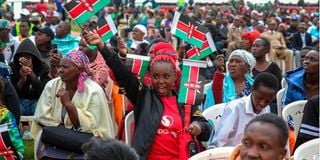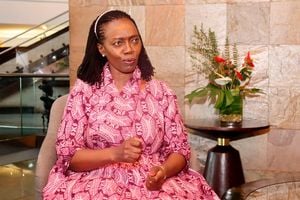Independence is rooted in empathy and understanding

Members of the public follows the proceedings during the Jamhuri Day celebrations at Uhuru Gardens, Nairobi on December 12, 2024.
Kenyans recently celebrated 60 years as a republic. As we conclude the year, let's reflect on our nation’s rich diversity—a source of pride that, at times, veils a deeper tension, one that tests our unity.
Conflicting perceptions and interests often challenge our national unity, creating division rather than harmony. In this context, social media, which is widely embraced by Kenyans, amplifies these clashes, serving as a platform for harshness towards differing perspectives.
To understand our state, we must recognise the paradox of human existence—the delicate balance of needs, where perception often contradicts reality. In the interplay of time, circumstance and competing interests, we see the complexity of humanity.
This paradox is reflected in the struggles we face, shaped by historical tensions and the scramble for limited resources. These forces create negative attitudes and perceptions, sometimes escalating into hostility. Let me illustrate this through a Somali parable that captures the complexity of human conflict and perception.
Dry and arid land
A wise man, living in a dry and arid land, posed a challenge to his people: “Can anybody among you utter words, however noble, that will not be perceived as harmful by another?” A man, confident in his convictions, rose and offered a heartfelt prayer for rain and peace: “Roob iyo Nabad.” As soon as the words left his lips, two men stood, their indignation boiling over. The first exclaimed: “Your prayer is a curse upon me! You wish for rain to wash away the footprints of my lost herd that strayed yesterday. Can’t you see that your prayer condemns my household to poverty?”
The second, equally aggrieved, retorted: “And what of your plea for peace? It is but a thinly veiled attempt to deny my family justice. You seek peace so that we abandon our pursuit of vengeance for the relative you murdered. You leave his blood to cry out unheard, which seems to give you pleasure.”
The man’s prayer, seemingly universal in its goodness, was reframed as a source of harm by those whose wounds and grievances shaped their perceptions. To him, rain signified renewal; to another, it meant the loss of hope. To him, peace was a noble ideal; to another, it was a denial of rightful justice.
This story raises critical questions about moral relativism: Is the pastoralist’s prayer wrong? Are the grievances of the two men unjustified? Perspective, not malice, should govern these judgements. The inevitable conflict of needs arises not from ill will but from the intricate and subjective nature of human existence.
Just as the men in the parable viewed the same prayer through different lenses, Kenyans, too, perceive progress and challenges through the lens of personal experiences and grievances. These differing perspectives, shaped by histories, fears and hopes, fuel our tensions. The tensions between progress and unmet needs illustrate the divide we face.
True empathy
But the solution does not lie in further division. It begins with recognising the humanity behind each voice. True empathy—the ability to understand and share in the struggles of others—offers the first step towards bridging our divides. The pastoralist’s prayer and the men’s grievances are not oppositional; they are facets of the same human endeavour.
—seeking survival, meaning and justice in a world of finite resources. If we acknowledge that all humanity shares similar elemental struggles, we may be more inclined to cultivate compassion.
Our desires, shaped by time and circumstances, reveal both our interconnectedness and contradictions. Let us recognise that our actions ripple far beyond what we can immediately perceive.
As we enter 2025, let us remember that our nation’s progress is not defined by the success of one group over another but by the strength of our shared unity and mutual understanding.
True unity does not demand uniformity; it calls for embracing our differences while recognising the common humanity that binds us all. This is the true meaning of independence—rooted in empathy and the acknowledgment of our shared struggles and aspirations.
Mr Omar is the Garissa County Health Executive; [email protected]





